Many contemporary philosophers think that the future of the Islamic world has a direct bearing on world peace and security, for it is potentially a serious power. Approximately one-fourth of humanity follows Islam, their lands contain rich natural resources, and the entire region has a great strategic importance. Until the Second World War, most Muslim countries were European colonies. Some of them had to undertake wars of liberation to gain their independence. This situation changed the look of Islamic geography. However, the real change took place after the cold war ended. Until then, the Islamic world was considered in terms of Africa, the Middle East and Asia; now, it has become more of a Eurasian affair with Albania and Bosnia to the west and Chechnya and Tajikistan, Kyrgyzstan and Kazakhstan to the east. In the 1980s, Turkey was the only Muslim country represented in the Organization for Security and Cooperation in Europe (OSCE). Now there are nine Muslim countries:Albania, Azerbaijan, Bosnia and Herzegovina, Kazakhstan, Kyrgyzstan, Tajikistan, Turkey, Turkmenistan, and Uzbekistan.8
Such changes in the Islamic world's demographic distribution have had an impact on the term "Islamic geography." Until the beginning of the twentieth century, except for short-term invasions, Muslims for the most part lived on Muslim soil under Islamic rule. From the beginning of the twentieth century onward, Muslims have migrated by choice to Europe and America, where they gradually became significant minorities. Currently, Islam is the fastest growing religion in those lands. This increase has enabled these Muslims to play a more active role in Western society and politics.
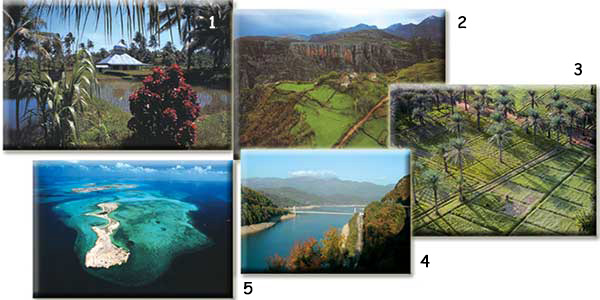 | ||
| 1. Indonesia | 3. Iran | 5. Djibouti |
| The Islamic world, which covers a vast geographic area, enjoys great wealth, with abundant natural beauty being the foremost. Under the Turkish Islamic Union, the Islamic countries will put these resources to better use. | ||
| If you tried to number Allah’s blessings, you could never count them. Allah is Ever-Forgiving, Most Merciful. (Surat An-Nahl: 18) | ||
Therefore, Islamic geography does not only refer to Muslim-majority or Muslim-ruled lands, but comprises a much greater area. From the Caucasus to Tanzania, and Morocco to Fiji, the Islamic world now stretches over a huge area and covers the lands that gave rise to the greatest civilizations in history. The region's geopolitical, cultural, and geo-economic qualities place this geography on the agenda of international relations and world politics even today.
The crossroads and transit routes of world trade are located within this area. Considering that the canals and straights joining the Black and Mediterranean seas, the Mediterranean Sea and the Persian Gulf with the Indian Ocean are under Muslim control, the Islamic world's importance in terms of global balance becomes better understood. Additionally, the world's richest lands, in terms of such strategically important natural resources as oil and natural gas, are located in Muslim countries. The effective use of these resources represents a strategic opportunity for the Islamic world to increase its impact on world politics.
 |
| Buddhism used to be widespread in the Maldives, a land known for its striking natural beauty. Later on, its people embraced Islam due to the missionary activities of Muslim travelers. Today, nearly all of its people are Muslims. |
The current situation clearly suggests that Muslims will influence the developments of the twenty-first century in one way or another. However, what really matters here is that this influence must benefit the Islamic world in particular and humanity in general. The first thing that comes to mind at this stage is whether the Islamic world can play such a role, given its present condition. No doubt, Muslims have the necessary ability and awareness to shoulder this responsibility. However, looking at Muslim nations today reveals many problems, among them the lack of established democracy, the inability to keep up with technological progress, and an underdeveloped economy. An Islamic world preparing to play an active role in world politics must solve these and similar problems first.
The Islamic world's disunity and fragmentation is an even more urgent and vital problem that must be resolved. The fact that the Muslims have not been able to create a powerful and active Islamic Union is a major contributor to many of today's ills. When a strong Turkish Islamic Union is formed, such problems will either not arise or will be resolved far quicker than anticipated.
 |
| Oil complexes in the United Arab Emirates and Saudi Arabia. |
It must be stated here that the diversity found in the Islamic world, as well as the existence of various schools of Islamic thought, is not an issue in this regard. Likewise, unity does not equal the same practice or system. Rather, this diversity must be united under the umbrella of faith and on the basis of mutual compassion and solidarity. Differences of thought, practice, or point of view are normal and common in all societies. Islamic morality requires that Muslims never forget that they are all brothers and sisters, irrespective of their differences. Whatever the race, language, nation, or branch of Islam one might follow, all Muslims are brothers and sisters. Therefore, such differences must be appreciated as a source of richness instead of as a source of potential conflict and fragmentation. Such a mistaken view only diverts one's attention from the real issues and delays urgently needed and important preventive action.
Subsequent chapters will deal with the need for a Turkish Islamic Union and what it will mean for world peace from economic, sociological, and political perspectives. However, first we must investigate the process that led to the Islamic world's disintegration and how this development can be reversed.
 |
| The twentieth century was one of oppression, violence, war, and conflict. Millions of innocent people lost their lives. |
The Islamic world began to disintegrate during the early years of the twentieth century. Until then, Muslims of different sectarian persuasions, races, and languages lived together in harmony and safety under the rule of Islam, and they were strong.
One of the most destructive movements of the nineteenth century, radical nationalism, had a powerful impact on the Islamic world, for some Muslims fell under the influence of the Western ideologies imposed upon them. With the weakening and then collapse of the Ottoman Empire, the vast majority of Muslim lands were colonized by Europe and the Soviet Union. Before the colonialists withdrew decades later, they drew up artificial borders and thereby created many new countries. When combined with the radical nationalism disseminated among Muslims, the region turned into a quagmire. Ethnic differences became sources of conflict, and the different Muslim ethnic groups, who had lived in the same land until recently, suddenly found themselves living on different sides of these artificial borders. Soon, these artificial nations began disputing with each other over borders and other matters, and feelings of hostility arose. Some of these disputes even escalated into full-scale brutal wars, as in the Iran-Iraq war. A 100-year long period of instability had begun.
One's love of nation, people, and independence is a proper and honorable feeling. However, nationalism becomes intolerable when love turns into fanaticism. If someone feels hostile toward other nations without due cause, he will, in the interest of his own country, disregard the rights of other nations or people. As a result, one country will seek to acquire or plunder another country's land, and thereby become intolerable. Likewise, if people turn their love for their own nation into racism, claiming to be genetically superior, they will have developed an insupportable idea. It is also an error to turn nationalism into a racist ideology, for this damages the Islamic principle that "all Muslims brotherhood and sisters," or to let animosity do away with it for good.
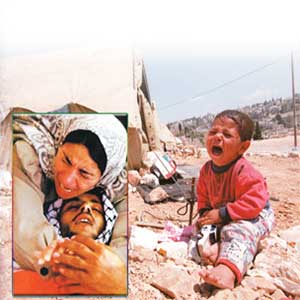 |
Allah points out this wrong attitude, known as "fanatical rage," and reveals that it is an aspect of ignorance. In the Islamic context, ignorance means people and societies that are far removed from the true religion, as Allah makes clear in the Qur'an:
Those who do not believe filled their hearts with fanatical rage—the fanatical rage of the Time of Ignorance—and Allah sent down serenity to His Messenger and to the believers, and bound them to the expression of heedfulness, which they had most right to and were most entitled to. Allah has knowledge of all things. (Surat al-Fath: 26)
Allah speaks of fanatical rage on the one hand and, on the other, that He gave believers serenity. The frame of mind of people who become angry and aggressive out of love for their own nation is against Islamic morality. The nationalism that developed in nineteenth-century materialist Europe was aggressive and radical. And this was the type of nationalism exported to the Islamic world and to many other lands, where it has caused nothing but conflict and political instability.
It is against Islamic morality to distinguish between people according to race or to allow ethnic differences to engender strife. Our Lord says in one verse:
O Mankind! We created you from a male and female, and made you into peoples and tribes so that you might come to know each other. The noblest among you in Allah's Sight is the one of you who best performs his duty. Allah is All-Knowing, All-Aware. (Surat al-Hujurat: 13)
 |
| All race-based theories, such as those adopted by Hitler, are great misconceptions. No race is inherently better or superior to another. |
Allah also reveals that racial and national differences are among His signs. These differences are not to be sources of conflict and hostility, but rather of richness and diversity:
Among His Signs is the Creation of the heavens and Earth, and the variety of your languages and colors. There are certainly Signs in that for every being. (Surat ar-Rum: 22)
History is full of examples of Islam's ability to resolve ethnic differences. Our Prophet (may Allah bless him and grant him peace) warned his Companions to avoid tribal or racial separatism; dividing people according to race, sex, language, or clan; and distinguishing between people according to financial means. In his Farewell Sermon, he proclaimed: "O people! Verily your Lord is one and your father is one. All of you belong to one ancestry of Adam, and Adam was created out of clay. There is no superiority for an Arab over a non-Arab and for a non-Arab over an Arab, nor for the white over the black nor for the black over the white, except in [terms of] piety. Verily, the noblest among you is he who is the most pious." 9
The continuing conquests under our Prophet (may Allah bless him and grant him peace) and the four rightly guided caliphs greatly expanded the borders of the Islamic world, and many different nations united under the flag of Islam. The Middle East, until then full of tribal wars and unrelenting blood feuds, found peace, and the inter-Arab tribal wars ceased both at home and abroad. Ongoing warfare between Christian sects was resolved peacefully, and tribes that had been mortal enemies learned to respect each other's rights and lived under the Islamic flag.
 |
Muslims of today must acquire the same outlook. In their mutual relations, faith and good character are important, not race, ethnic origin, language, financial means, status, or office. Love between sincere believers develops through their fear and awareness of and true love for Allah, and good deeds and a good character. If people dedicate themselves to the path of Allah, follow it in all their actions and behavior, and do good in the hope of acquiring Allah's good pleasure and mercy, other believers will love and respect them. As a result, their skin color, race, or financial status will be irrelevant and have no bearing on the love others feel for them. The same criteria must be true for relations between Muslim nations, which must be based on the Qur'anic insight that Muslims are one another's helpers and guardians.
One of the foremost reasons for the Islamic world's current fragmentation is its lack of this consciousness, the disregard for Islamic morality, and the effect of irreligious ideologies and movements. Some intellectuals were misled by various European philosophies and ideologies, which were full of errors, and believed that introducing them into the Islamic world would aid its progress. The damage caused by this historic mistake are still visible today. Instead of the justice, devotion, compassion, open-mindedness, and progressive thinking brought by the Qur'an's values, the attempted imposition of false philosophies and ideologies have replaced the order and solidarity of the Islamic world with disorder and disunity. In some countries, models opposing the Qur'an's values were developed in order to end the disorder. However, this only brought about despotic regimes that oppressed the people.
It is important to learn from these past mistakes when choosing a new strategy and to be aware of misleading manipulations and suggestions. History clearly shows that the Islamic world can rise again only if it returns to its own central tenets and values, the most important of which is Muslim unity and solidarity.
An Interview With Mr. Adnan Oktar By Al Baghdadia TV, June 29th, 2008 |
| Reporter: Muslims are being massacred. First in Bosnia and now in Iraq and Afghanistan. What do you think should be done in Palestine? Adnan Oktar: It is a sin for Muslims not be united and act as one. It is unlawful. According to the Qur'an, it is obligatory for Muslims to act together as one as brothers, for them all to be brothers to one another and to gather around a single leader. But Muslims are not doing that. As they fail to do that, it opens the way to all kinds of affliction. Muslims will abide by that obligation. What I am saying is that a Turkish-Islamic Union must be established under Turkish leadership, under the leadership of the Turkish nation. All countries will still be nation states in it. Every state will act freely domestically, but they will have a spiritual leader at their head. The Christians have a leader, the Pope. Muslims must also have a spiritual leader. This disorder and corruption will easily come to an end if there is a leader at the head of this spiritual union. In that event, if even a hair of Muslims' heads is harmed anywhere in the world, the incident will be stopped at once since all Muslims will act as one. But if they are fragmented, if they act in such a way as to make a policy of divide and rule possible, then it is easy to swallow the small pieces up. But it is impossible to swallow up the Muslim world as an entire block. Muslims must fulfill this obligation without delay. |
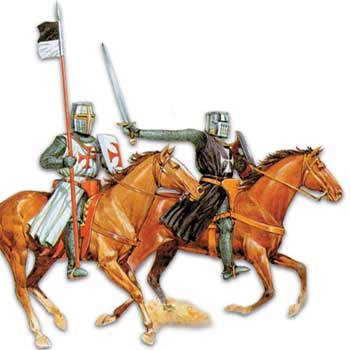 |
| "Collision of Arab Horsemen." Oil painting on canvas, The Walters Art Gallery, Maryland. |
The Islamic world's stance against the Crusaders is an important example in this regard. When the armies of the First Crusade reached the Middle East, the Muslims were divided into fractions stemming from various disputes and arguments. This disunity prevented them from putting up an effective resistance, and so the barbaric European invaders were able to create an empire centered on Jerusalem after slaughtering the native population. However, decades later, the Muslim commander Saladin united the different Muslim groups under his command and defeated the invaders.
Nevertheless, defeating the Crusaders was not going to happen overnight. Saladin not only united the Muslims under one flag, but also started a scientific and moral awareness. The Encyclopedia Britannica says:
It was an essential part of his [Saladin's] policy to encourage the growth and spread of Muslim religious institutions. He courted its scholars and preachers, founded colleges and mosques for their use, and commissioned them to write edifying works . . . Through moral regeneration, which was a genuine part of his own way of life, he tried to re-create in his own realm some of the same zeal and enthusiasm that had proved so valuable to the first generations of Muslims when, five centuries before, they had conquered half the known world. 10
When this moral, scientific, and religious regeneration combined with political unity, Islamic civilization rose once more. Saladin, commanding a united Islamic army, defeated the disbanded and demoralized Crusaders at the Battle of Hattin in 1187 and freed almost all of the occupied Palestinian land, including Jerusalem.
 |
| A painting showing the Crusaders' 1099 massacre and destruction during their invasion of Jerusalem. |
One of the most prominent aspects of Saladin's Islamic Union was that it represented the Qur'anic ideals of justice, moderation, and peacefulness. While best known for this military victory, Saladin was also very forgiving and just toward the Crusaders as well as all other Christians. Even though the Crusaders had inflicted unspeakable cruelty on the Muslims, Saladin exacted no revenge upon them, and no civilian was harmed when he freed Jerusalem. In addition, he maintained his authority over the radicals within his own ranks. Following the slaughter of 3,000 innocent Muslim civilians at Castle Acre, ordered by King Richard the Lion-Hearted, commander of the Third Crusade, some Muslims demanded revenge: They wanted to massacre Jaffa's (today's Tel Aviv) Christians. Saladin successfully calmed his soldiers down and extinguished their bloodlust, and so guaranteed the safety of Jaffa's Christians.
In the end, Saladin brought peace to the Holy Land by granting the Crusaders some privileges and concessions. On 28 August 1192, the two parties agreed upon and signed a peace treaty. Saladin made a great gesture: He invited the Crusader's commanders, who had killed thousands of Muslims in their quest to conquer Jerusalem, to stay there as his guests. Those Crusaders visiting Jerusalem were astonished by the Muslims' great forgiveness, compassion, and justice. On one occasion, upon learning that his former enemy King Richard was sick, Saladin sent his own physician to treat him, along with some ice to reduce his temperature. Saladin became a legend throughout Europe for his righteous character, which was based on the Qur'an's values.
In short, Saladin's Islamic Union gave the Muslims power and victory, as well as the opportunity to realize the justice, compassion, and peacefulness central to Islamic morality. Muslims were moved to serve Islam, prevent some radical movements from spreading among Muslims, and live according to the Qur'an.
Eight centuries have passed since the time of that Islamic Union. Today's Muslims need an Islamic Union for the same reasons as they did back then. Although the Islamic world is not under attack by a coalition army, as it was at the time of the Crusades, it is facing many threats. Furthermore, the Islamic world has fallen behind other civilizations in terms of science, technology, culture, art, and thought. Ever since the nineteenth century, the Islamic world has been seriously harmed by the many false ideologies and philosophies produced elsewhere, imported into its midst by misguided people, and spread among those who were not familiar with the Qur'an's values. On the other hand, some radicals who claimed to represent Islam while doing their best to subvert its morality, often unknowingly helped those who were consciously sewing the seeds for later conflict.
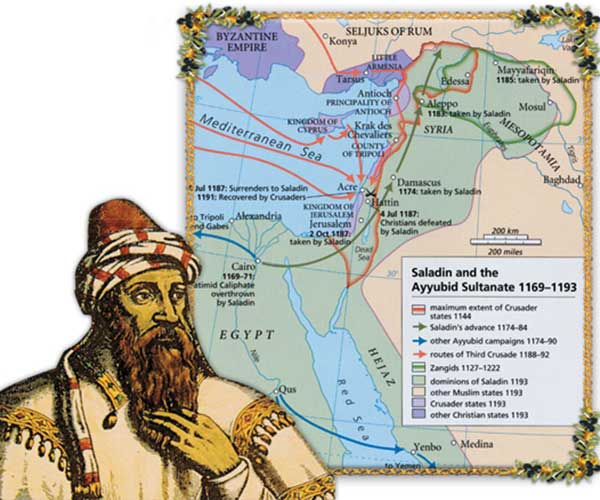 |
| The borders of the Ayyubid Sultanate before and after Saladin's reign. |
For all of this to end, Muslims must rebuild their civilization so that it can once again guide the world, light the path, and deliver peace and justice. But if this vision is to become a reality, they must follow Saladin's method: working for the rebirth of Islamic morality, knowledge, and faith, and achieving the Islamic world's political union.
The necessity for such a union is based not only on the need for a political solution to end the current situation; rather, and more importantly, unity is a requirement of being a Muslim. As in all areas of their lives, Muslims have to abide by the Qur'an's values in their national and international policies. As this morality requires the Islamic world's reunification as a priority, taking Islamic morality as the guiding principle will make this alliance possible, as well as long-lived and active.
Islamic morality requires Muslims to be conciliatory at all times and to be brothers and sisters in faith, as well as in solidarity and union. Allah commands the believers to: "not quarrel among yourselves" (Surat al-Anfal: 46), for doing so will only weaken them. Allah commands the following in another verse:
Do not be like those who split up and differed after the Clear Signs came to them. They will have a terrible punishment. (Surah Al 'Imran: 105)
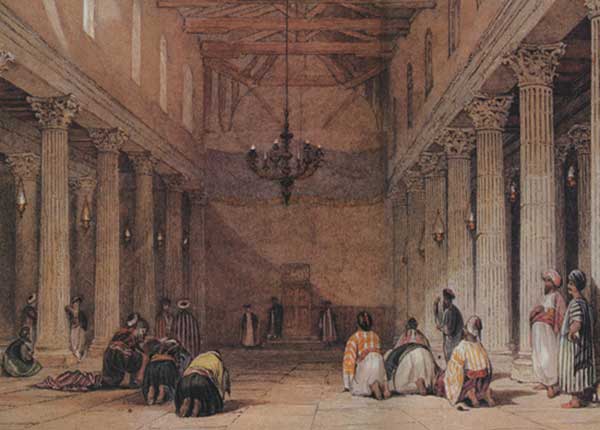 |
| Chapel at Bethlehem, Thomas Allom |
| Mankind! We created you from a male and female, and made you into peoples and tribes so that you might come to know each other. The noblest among you in Allah’s Sight is the one of you who best performs his duty. Allah is All-Knowing, All-Aware. (Surat al-Hujurat: 13) |
It is impossible for Muslims who have common sense and conscience not to unite with other believers or to be engaged in an ongoing dispute with them. This is true on an individual basis, as well as on the level of communities and nations. Allah points out this fact in the Qur'an and forbids Muslim nations to be unfair or hostile to one another. Allah states that those who engage in such harmful activity must be stopped, and instructs other Muslim nations to "make peace between them":
If two parties of the believers fight, make peace between them. But if one of them attacks the other unjustly, fight the attackers until they revert to Allah's command. If they revert, make peace between them with justice and be even-handed. Allah loves those who are even-handed. (Surat al-Hujurat: 9)
Of course, there can be cultural, traditional, and local differences of attitude and practice between Muslim nations due to different views, interpretations, and schools of thought. Such things are natural. However, these differences should not lead Muslim nations to antagonize one another, end their mutual dialogue, and consider the other nation as foreign and hostile, instead of agreeing on their common values. Doing so only leads to intolerable situations.
An Interview With Mr. Adnan Oktar By Denge TV, December 9th, 2009 |
| Adnan Oktar: This spirit of opposition stemming from this sectarian difference needs to be eliminated. Shiites, Alawites, Bektashis and Wahabbists are all our brothers. They are all spotless, honest, pious believing people. They all have a profound love of Allah and the prophets. They are therefore a blessing for us, our brothers. They are all a blessing. That idea of opposition needs to be eliminated. Once Islamic moral values spread across the Turkish-Islamic world this will lead to industriousness, activity, clarity of mind, discipline, trust in Allah, cleanliness, quality and profound reason. The whole region will enjoy the resulting abundance and beauty. The Christian world and the Jews will also benefit from it. This needs to be hastened. |
An Interview With Mr. Adnan Oktar By Indonesia's Antara News Agency, |
| Adnan Oktar: For one thing, they must love one another, and there must be no sectarian differences. Alawite, Sunni or Shiite, we are all brothers. They must have joyous, loving ties to one another. The coming of Hazrat Mahdi (pbuh) is imminent. The Prophet Jesus (pbuh) will return at any moment. They will see that what I am saying is true within the next 10 years. All of the signs have come about. People must joyously prepare for the Turkish-Islamic Union. By Allah's leave, our lives in Paradise will also be most delightful, insha'Allah. We may hope for that from Allah if we make such genuine efforts. We are entities for whom eternity has already begun. We are entities who will exist for all eternity, once we have been created. Insha'Allah, we will live on in Paradise. But it is essential that we be completely honest, that we love one another with a great fervor. We must bow our heads to Allah. We must strictly follow the Qur'an and live by the morality revealed in it. When people do that, their hearts can be at peace, insha'Allah. |
Allah warns Muslims away from such mistakes and reveals the People of the Book's (the Jews and Christians) errors in this respect as an example of what can happen. Allah states in Surat al-Bayyina: 4 that they were divided among themselves and went their own ways, even though they received Clear Signs to the contrary. Allah states in other verses that the causes for this split were such evil character traits as envy, injustice, and rebellion against truth. The following are some of these verses:
They only split up after knowledge came to them, tyrannizing one another …(Surat ash-Shura: 14)
The religion with Allah is Islam. Those given the Book only differed after knowledge had come to them, envying one another. As for those who reject Allah's Signs, Allah is swift at reckoning. (Surah Al 'Imran: 19)
Jewish and Christian history is full of conflict because of this continuing disunity. Christianity's first 16 centuries also can be described as the history of warring Christian sects. Even small differences in interpretation led to mutual accusations of heresy. Over time, the Catholic Church gained the upper hand and began to persecute other religious schools of thought that it considered heretical, such as Docetism, Montanism, Adoptionism, Sabellianism, Arianism, Plagiarism, and Gnosticism. The Catholic Church's persecution of such religious denominations as the Cathars and the Bogomils from the eleventh century onward, as well as the century-long bloody war between the Protestants and the Catholics, coincide with the darkest era of European history. It is interesting to note that European civilization began to rise after this sectarian warfare ended. As political scientists acknowledge, modern Europe was only born after the various Christian sects agreed to mutual compassion at the Peace of Westphalia in 1648.
People diverge in their religious practices and understandings because they do not practice morality, as commanded by Allah. This morality recognizes modesty. Those who distance themselves from this modesty perceive their own ideas as the ultimate truth, disregard those who think differently, and feel animosity toward them. Since they do not doubt the truth of their own views, they do not question themselves and so cannot improve themselves and find the truth. Allah describes those who only value their own opinions in the following way:
They disagreed and split up, dividing into sects, each party exulting in what it had. (Surat al-Muminun: 53)
Muslims who fear and respect Allah, and who believe that they will have to account for their actions on the Day of Judgment, must be aware of this situation. Those who realize the importance of this matter must warn other Muslims about the dangers of disunity, fragmentation, and segregation, and work for Muslim unity under the Qur'an's values.
Exemplary Muslims approach other people with love, compassion, and mercy, for they view all people as manifesting some of our Lord's names and attributes. They consider all people who share the same belief, and who believe in the Qur'an, obey Allah's commandments, and abide by the Sunnah of our Prophet (may Allah bless him and grant him peace), as their brothers and sisters, and never forget that they are one another's guardians. They must refrain from factionalism rooted in cultural, traditional, or differences of opinion and, instead of making an issue of them at every opportunity, must support unity under the Qur'an's values. Muslims must support one another in this union and be compassionate and understanding when dealing with disputed matters. As we pointed out previously, sincere Muslims who are aware of this issue's importance, as well as the Islamic world's leading thinkers and intellectuals, are especially obligated to work resolutely for Muslim solidarity and unity. A solidarity based upon love, respect, and compassion must be established in the Muslim world.
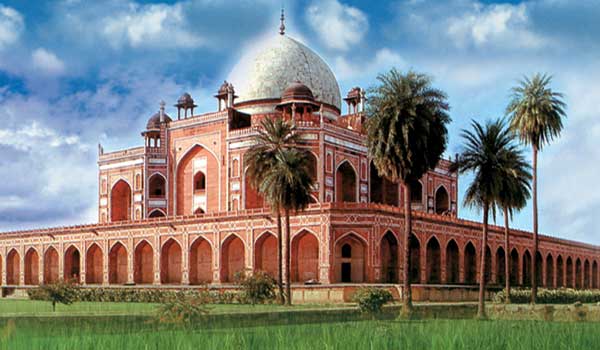 |
| Humayun's Tomb, India. One of the most important works of the Mughal Empire. |
| Hold fast to the rope of Allah all together, and do not separate. Remember Allah's blessing to you when you were enemies and He joined your hearts together so that you became brothers by His blessing You were on the very brink of a pit of the Fire and He rescued you from it. In this way Allah makes His Signs clear to you, so that hopefully you will be guided. (Surah Al 'Imran: 103) |
At its core, Islamic morality envisages religious unity and common values, rather than disputes and segregation. The Prophet Muhammad (may Allah bless him and grant him peace) showed the way for Muslims with the following hadith:
I have left among you the Book of Allah and the Sunnah of His Apostle. If you hold fast to them, you shall never go astray.11
We just have to abide by this advice. Our Lord commands all believers to follow the true religion and refrain from disunity. Allah says:
He has laid down the same religion for you as He enjoined on Noah: that which We have revealed to you and which We enjoined on Abraham, Moses, and Jesus: "Establish the religion and do not make divisions in it." What you call the idolaters to follow is very hard for them. Allah chooses for Himself anyone He wills, and guides to Himself those who turn to Him. (Surat ash-Shura: 13)
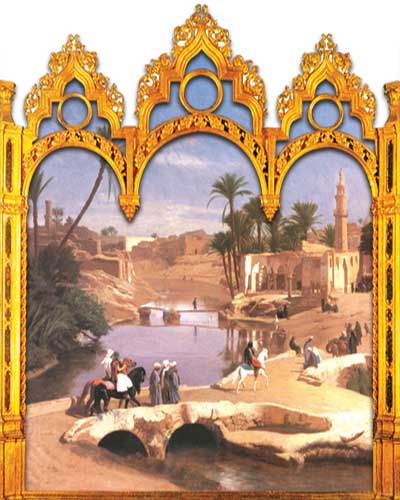 |
| "The city of Faytoum." Paul Renoir, Mathaf Gallery, London. |
Unity requires awareness, devotion, allegiance, and loyalty. Allah prescribes unity for Muslims and reveals that satan will attempt to create conflict in order to prevent this unity. Muslims are obliged to refrain from hurtful words, anger, disrespectfulness, and all other behavior that could damage this sense of unity when dealing with fellow Muslims. Each Muslim is required to be devoted to others, patient, work for the good of others, and loyal and true. All Muslims must adopt these superior qualities.
A good example of this is the relationship between those Muslims who emigrated to Madinah with our Prophet (may Allah bless him and grant him peace) and those Muslims who were already settled there. The Muslims who pledged their allegiance to our Prophet (may Allah bless him and grant him peace) in Madinah welcomed the Meccan migrants in the cause of Allah in the nicest possible way and took good care of them. These two different communities, which had no mutual tribal bonds, considered loyalty to Islam to be the only important yardstick. The Muslims of Madinah proved their loyalty by opening their homes, sharing their food, and considering the migrants' needs before their own. Our Lord reveals their good conduct in the Qur'an:
Those who were already settled in the abode, and in faith, before they came, love those who have emigrated to them; do not find in their hearts any need for what they have been given; and prefer them to themselves, even if they themselves are needy. It is the people who are safe-guarded from the avarice of their own selves who are successful. (Surat al-Hashr: 9)
The exemplary and superior character demonstrated in this verse reveals how the relationship between two Muslim communities should be. Our Prophet (may Allah bless him and grant him peace) describes solidarity in the following hadith:
Muslims are like one body. If the eye is sore, the whole body aches; if the head aches, the whole body aches. 12
The love between Muslims and the absence of any ill-will are great gifts of Allah. Allah says the following about this gift, which will be completely fulfilled in Paradise:
We will strip away any rancor in their hearts—brothers, resting on couches face-to-face. (Surat al-Hijr: 47)
 |
| "Interior of the Mosque of the Metwalys," by British painter David Roberts. |
| Obey Allah and His Messenger and do not quarrel among yourselves lest you lose heart and your momentum disappear. And be steadfast. Allah is with the steadfast. (Surat al-Anfal: 46) |
Therefore, Muslims must act with the awareness that solidarity, fraternity, and a sense of belonging are gifts that must be protected by means of patience and strong will. Allah also reveals the importance of this unity in the following verse:
So heed Allah and put things right between you. Obey Allah and His Messenger if you believe. (Surat al-Anfal: 1)
Our Prophet (may Allah bless him and grant him peace) states the importance of unity in the following hadith:
Do not envy one another, do not hate one another, do not turn away from one another, and do not undercut one another. Rather, O servants of Allah, be brothers… 13
Muslims are always obliged to be forgiving, but if the other party consists of Muslims, the first party must be even more patient. They must remember that the second party consists of fellow Muslims, and that both parties fear Allah, obey the Prophet (may Allah bless him and grant him peace), and abide by the Qur'an's definitions of right and wrong. All Muslims know that they must have only goodwill toward their fellow Muslims; that they should be considerate; and that they should respond with patience, compassion, and love when disagreements arise. Allah reveals the prayer of Muslims for their fellow Muslims:
Those who have come after them say: "Our Lord, forgive us and our brothers who preceded us in faith, and do not put any rancor in our hearts toward those who believe. Our Lord, You are All-Gentle, Most Merciful." (Surat al-Hashr: 10)
Just as Muslims are obliged to mediate in friendship between their each other, they are obliged to resolve any dispute between two Muslim communities. Allah says:
The believers are brothers, so make peace between your brothers and heed Allah, so that hopefully you will gain mercy. (Surat al-Hujurat: 10)
Clearly, this mentality creates a very strong sense of belonging and unity, for our Lord states:
Allah loves those who strive in His Way in ranks like well-built walls. (Surat as-Saff: 4)
 |
| The prevalence of violence and cruelty reveals dimensions of the responsibility upon Muslims. |
This ideological struggle against irreligious philosophies and ideologies is a duty of all Muslims. No doubt, it is a historical mistake to develop a closed community struggling with internal affairs instead of shouldering the responsibility of this ideological struggle to bring light to an otherwise dark world. At present, humanity, especially the oppressed Muslims, is looking for a way out of this situation and is awaiting the arrival of a guidance that will bring peace, happiness, and justice to the world and remind all people of the true purpose of their existence. This guidance is the responsibility of the Islamic community, and all Muslims are obliged to act with awareness.
The fact that violence, terror, cruelty, fraud, dishonesty, immorality, conflict, and poverty are common proves that the world is full of "corruption." In the face of this reality, many issues that have become a problem among Muslims lose their importance. All of this cruelty and degeneration feeds off the false systems established by those who deny Allah's existence and unity and do not believe in the Hereafter. Therefore, people of conscience must unite in righteousness.
This unity will be one of the most important phases in the defeat of irreligious ideologies. Our Lord points out the nonbelievers' alliance and reveals the necessity of Muslim friendship and solidarity in order to rid the world of cruelty. Allah says:
Those who do not believe are the friends and protectors of one another. If you do not act in this way [protect each other], there will be turmoil in the land and great corruption. (Surat al-Anfal: 73)
Given that the Muslims have such a large responsibility, they must unite. If situations prevent them from doing so, they should consider the following questions:
 |
"Is this issue more important than the unity of Islam?"
"Is it beyond resolution?"
"Is it acceptable to dispute with another Muslim community instead of working against irreligious ideologies?"
Everybody who answers these questions conscientiously will know that the higher priority is to refrain from endless disputes and to establish a union based on the Qur'an's values.
Muslims must never forget that satan is always working to cause enmity between Muslims in order to prevent their unity and solidarity. Our Lord warns believers of this danger:
Say to My servants that they should only say the best. Satan wants to stir up trouble between them. Satan is an outright enemy to man. (Surat al-Isra': 53)
With this verse, Allah advises Muslims to avoid directing hurtful, mocking, harsh, and accusing words against other Muslims and points out the need for decent conduct in the pursuit of unity.
In the Qur'an, Allah also points out that such disputes and other damaging behavior impair one's sense of belonging and weaken the Muslims' power. Our Lord says:
Obey Allah and His Messenger and do not quarrel among yourselves, lest you lose heart and your momentum disappear. And be steadfast. Allah is with the steadfast. (Surat al-Anfal: 46)
As stated earlier, this is true for Muslim individuals as well as Muslim nations. If the Islamic world wants to erect a powerful, stable, and prosperous civilization that guides and illuminates the world in every aspect, it must act in union. The lack of such a union is responsible for the Islamic world's discord and separation, the absence of a common voice, and the defenselessness of innocent Muslims. Countless poor women, children, and elderly people are desperately in need of rescue from oppression in Palestine, Kashmir, East Turkistan (home of the Chinese-ruled Muslim Uighur people), the southern Philippines (home of the Muslim Moro people) and many other regions. The responsibility for these people belongs to the Islamic world before anyone else. Muslims must never forget the Prophet's (may Allah bless him and grant him peace) following words:
A Muslim is a Muslim's brother. He does not wrong him or abandon him. 14
 |
| Obey Allah and His Messenger and do not quarrel among yourselves, lest you lose heart and your momentum disappear. And be steadfast. Allah is with the steadfast. (Surat al-Anfal: 46) |
The Islamic world must put its various disputes aside and remember that all Muslims are "brothers" and "sisters" so that it can provide role models who reflect the true character of Islam and its ideals. This unity of the believers is a gift and grace of Almighty Allah. Sincere Muslims must thank our Lord for these benefits and obey His command "not to separate":
Hold fast to the rope of Allah all together, and do not separate. Remember Allah's blessing to you when you were enemies, and He joined your hearts together so that you became brothers by His blessing. You were on the very brink of a pit of the Fire, and He rescued you from it. In this way Allah makes His Signs clear to you, so that hopefully you will be guided. (Surah Al 'Imran: 103)
An Interview With Mr. Adnan Oktar By Al Baghdadia TV, August 5th, 2008 |
| Adnan Oktar: You know my ideas. I am a follower of the creed of the Ahl al-Sunnah. … For one thing, we must eliminate all sectarian differences. These are completely unconscionable. Wahhabism, Shiism and Sunnism are all fraternal sects. We all live together. We are all brothers. Muslims must never be one another's enemies on the pretext of sectarian differences. They are all sects of great piety. They are all sects that scrupulously abide by the faith. There is no division among us. We all believe in the same Allah and the same Prophet. We face the same direction in prayer. We love the same prophets. We are the same in just about everything. A spirit of opposition caused by differences of minor detail would be very ugly. It would mean falling into satan's trap. My brothers must take great care over this. All Muslims must love one another. For example, when a Shiite meets a Sunni he must embrace him and ask how he is doing. When he meets Wahhabist brothers, for example, he must go to their homes and embrace them and dine with them and even pray with them. I sometimes hear people say they do not pray behind each other, and that is totally out of order. They must be happy to pray behind them. Be they Shiite or Wahhabist or Sunni… It makes no difference, as we are all brothers… This ill becomes any Muslim. |
As mentioned earlier, quarrels and disputes cause internal disintegration, which weakens Muslims' spiritually. This is one of the many secrets that Allah reveals to believers, and it points to another important reality: Just as disputes and quarrels weaken them spiritually, unity and solidarity strengthen them. Allah tells Muslims to unite and resist when they are wronged (Surat ash-Shura: 39). This Divine order contains great wisdom. For instance, destroying irreligious ideologies will be possible only when the Muslims unite.
However, what truly makes the believers' union so strong is their faith and loyalty. Since only genuine faith can engender true friendship and alliance, Muslims must love one another with a pure heart and for the good pleasure of Allah, without the slightest selfish interest. A union built on the strongest foundation known to humanity—the fear and love of Allah—will never shatter, unless Allah wills otherwise. Such a strong alliance will naturally give the Muslims rarely achieved power. With the following verse, Allah points out that success does not depend upon a group's size:
How many a small force has triumphed over a much greater one by Allah's permission! Allah is with the steadfast. (Surat al-Baqara: 249)
A union of Muslims based on faith and devotion will provide them with the necessary enthusiasm and willpower for great success.
In another verse, Allah reveals that although the deniers appear to be united, they have not achieved true unity:
Their hostility toward each other is intense. They are full of bravado in each other's company. You consider them united, but their hearts are scattered wide. That is because they are people who do not use their intellect. (Surat al-Hashr: 14)
 |
| By acting in a spirit of unity and cooperation, the Muslims will set a very good example for all other societies. The essentials of the Qur'an's values, such as justice, compassion, love, and understanding will spread to the rest of the world. In other words, Muslim unity will be a blessing for all of humanity. |
Irrespective of how solid a union appears to be, it is in fact very unstable if it is not built on sincerity and genuine intentions, for this means that it is based only on various interests. And, when any of these interests is threatened, the union will fall apart quickly. Since Allah has revealed this secret in the Qur'an, the Muslims' union is not shaken by worldly losses; rather, it is strengthened. This awareness makes the union very solid. The great Islamic scholar Said Nursi uses the following example to explain why a union formed by sincere Muslims will be strong:
So we are surely in need of solidarity and true union, obtained through gaining sincerity—for the mystery of sincerity secures through four individuals the moral strength of one thousand one hundred and eleven—indeed, we are compelled to obtain it.
Yes, if three alifs [the letter "A" in Arabic which takes the shape of a single vertical stroke, like the letter "I" or the number 1] do not unite, they have the value of three. But if they do unite, through the mystery of numbers, they acquire the value of one hundred and eleven. If four times four remain apart, they have a value of sixteen. But if, through the mystery of brotherhood and having a common goal and joint duty, they unite, coming together shoulder to shoulder on a line, they have the strength and value of four thousand four hundred and forty-four. Just as numerous historical events testify that the moral strength and value of sixteen self-sacrificing brothers have been greater than that of four thousand.
The underlying reason for this mystery is this: Each member of a true and sincere union may see also with the eyes of the other brothers and hear with their ears. As if each person of a true union of ten has the value and strength of seeing with twenty eyes, thinking with ten minds, hearing with twenty ears, and working with twenty hands.15
The subjects we have explored so far show the need for Islamic world's unity and the nature of such a union. The rest of the book will deal with the features of this Turkish Islamic Union.
An Interview with Mr. Adnan Oktar By Crimean Newspapers, November 14th, 2008 |
| Adnan Oktar: The Turkish-Islamic Union is not utopian. That would be like asking how Konya and Istanbul, Erzurum and Ankara came together. It is the state of division that is peculiar. Would it be at all logical for one to take Erzurum or Konya from us and say that "your uniting together is a pipe dream"? Division was forcibly imposed on us at one time. But if there is a nation, and everyone uses the same language and shares the same religion, then they are one nation. How could they all be separate? ... Of course the states will remain separate. Azerbaijan, for example, will remain as a separate state, but there are two states, one nation. Kirkuk will remain separate of course, but as two states, one nation. And Crimea likewise, as two states, one nation. In other words, we are one nation. [They ask,] "How can this be possible?" So how did the Common Market come about? How did the EU come about? Is it somehow impossible when it is something to do with Muslims? We even share the same language, religion, lineage and everything. We have the same customs, traditions and everything. They say we cannot be united. So how come Europe is united? How does NATO come together? They all fight alongside one another, these people. I mean, when they have to fight, they all fight together and are prepared to die. Since they are capable of such a unity as that, why should the Turkish-Islamic Union not come into being? Questioning it is something so illogical as to be actually unanswerable. Of course it will happen. This is a sociological fact. But we need to be very honest in doing this. If someone stands up and says: "We will build the Turkish-Islamic Union, and we will rule the world. The Turkish race is the greatest. It is the top race. We will rule the entire world," then that is out of the question. But you stand up and say: "The Turkish nation is a very noble and well-mannered one, full of love and in favor of peace, and altruistic. In times of difficulty they will wish to use all the means at their disposal, their selves and their wealth, to isolate the situation in question and put it right. We treat all the nations of the world with love and affection..." Some say, for example, that Russia will collapse when there is a Turkish-Islamic Union. But why should it collapse? Why should Russia collapse? Russians are lovely people, why should they be unhappy? Why should there be any suffering there? Why should we be happy on the back of their suffering? What happiness can there be if it is built on another's suffering? How could we rejoice if Russia were to collapse? Our happiness will be all the greater if Russia prospers, grows, develops and gets stronger. Let us be friends and live together. Russia is in any case a kind of Turkic state. There are Turks all over it. It is a kind of Islamic country. It is full of Muslims everywhere. Why should we be enemies? For one, they must abandon that mindset. It is totally illogical. Bigotry must end, and all the countries of the world will then approach this beauty willingly and happily. That is because the Turkish-Islamic Union will benefit all of Europe, America, China and Russia. That is because the world wants there to be no terror, and this union will put an end to terror. It will eliminate terror all over the world. Not just in the Islamic world, but everywhere. A huge economic power will emerge. A huge underground wealth will emerge. And a huge manpower. And the most wonderful art and beauty. And a spirit of love. This needs to be very well emphasized. Nobody in the world will oppose it. Communists will not oppose it. Neither mad people nor sane will oppose such a thing. But if you stand up egotistically and say, "I am the greatest," and "I will crush everyone else," then they will put the blocks up straight away all over the world. Why are we opposed to atheist Zionism? The whole world is opposed to it because of their violently psychopathic attitude. But we love Israel. We love the people. We love the Jews. They are our dear brothers. Let them live in plenty and abundance. May Allah grant them long and good lives. We have no disagreements with them. Armenians are also our very dear brothers. They are our old friends and brothers. They were forced to split away from us. We used to call them the Loyal Nation. We had Armenian generals, artists and scientists. It was as if they had torn our hearts out. Why should Armenia split away from us? Armenia is a country that must assume its place in the Turkish-Islamic Union. And Georgia. Let us embrace one another and be as one. Let us trade. Let us collaborate in industry. Let us open hospitals and schools and set up facilities. Let us build roads. Let us help one another so they will be happy and we can rejoice at their happiness. We are a nation that delights in the happiness of others. We are happy when others are happy. We cannot build joy and happiness on the suffering of others. The whole matter lies in telling people that. Once we have laid that out, America, Russia and everyone will sign up to it. As they actually do now. |
8. Ahmet Davutoglu, Stratejik Derinlik-Turkiye'nin Uluslarası Konumu (Strategical Depth: Turkey's International Status) (Istanbul: Kure Publications, 2001), 250.
9. Sahih Bukhari.
10. "Saladin," The Encyclopedia Britannica, 2002 CDEdition.
11. Sahih Bukhari.
12. Sahih Muslim.
13. Ibid.
14. Sahih Bukhari and Sahih Muslim.
15. Bediuzzaman Said Nursi, Risale-i Nur Collection, "The Twenty-First Flash, Your Second Rule."